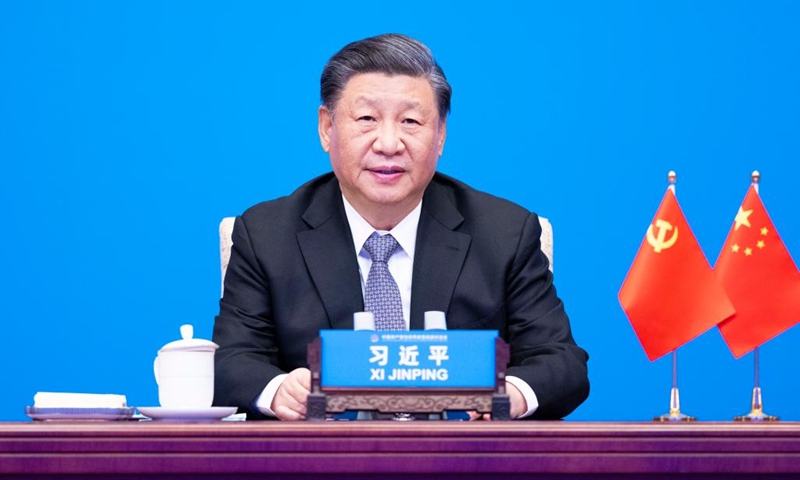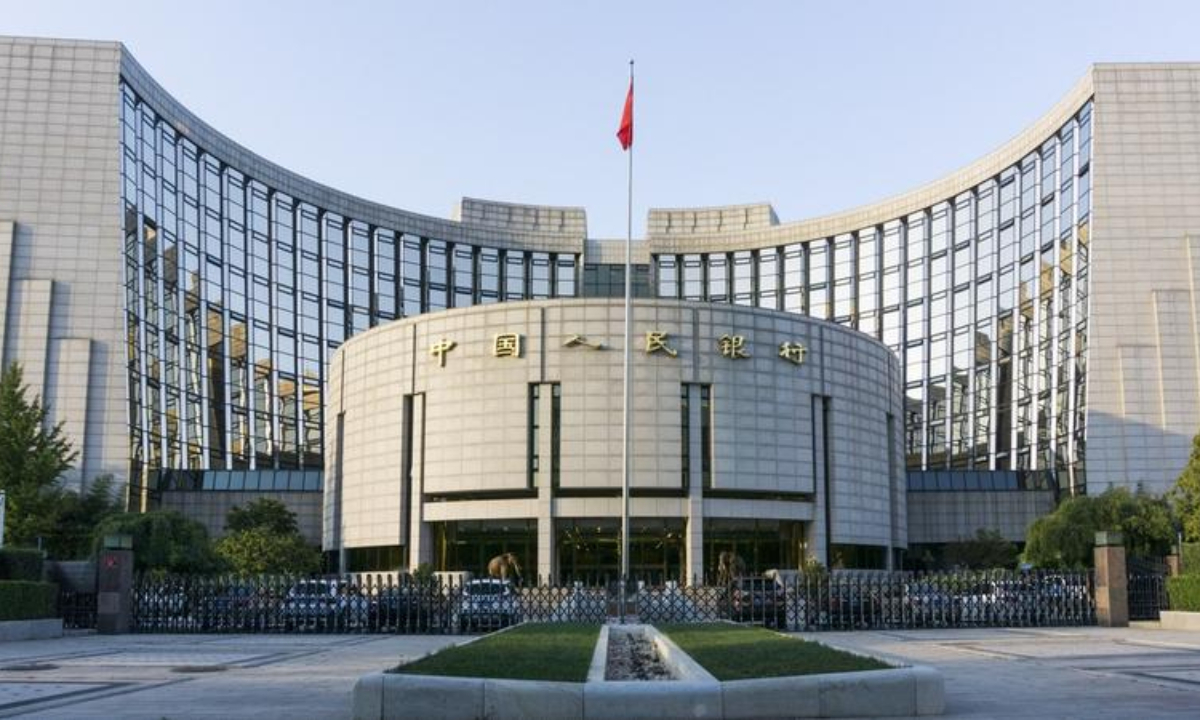Xi Jinping, general secretary of the Communist Party of China (CPC) Central Committee and Chinese president, attends the CPC in Dialogue with World Political Parties High-Level Meeting via video link and delivers a keynote address in Beijing, capital of China, on March 15, 2023. Photo: Xinhua
Global Civilization Initiative proposed by Xi 'provides hope to heal the world in turbulence'
Xi Jinping, general secretary of the Communist Party of China (CPC) Central Committee and Chinese president, proposed the Global Civilization Initiative. Experts said following the Global Development Initiative and the Global Security Initiative, China is trying to share its wisdom and plans to bring new hope for all nations to consider together on how to escape the trap of the "Clash of Civilizations" and find a path that can help the world sail through the current turbulence.
Xi proposed the initiative during his key note speech on Wednesday at the opening ceremony of the CPC in Dialogue with World Political Parties High-Level Meeting via video link and delivered a keynote address. Under the initiative, Xi called for respect for diversity of civilizations, advocating the common values of humanity, highly valuing the inheritance and innovation of civilizations, and jointly advocating robust international people-to-people exchanges and cooperation. "We are ready to work together with the international community to open up a new prospect of enhanced exchanges and understanding among different peoples and better interactions and integration of diversified cultures. Together we can make the garden of world civilizations colorful and vibrant," Xi said.World needs hope
According to a Xinhua News Agency story on Thursday, South African President Cyril Ramaphosa, also president of the African National Congress, and 11 other leaders of political parties and political organizations also addressed the dialogue on Wednesday. They spoke highly of Xi's proposals in his keynote speech, and expressed their willingness to work with the CPC to play a leading and driving role in the modernization process. "We fully agree with the four proposals put forward by Chinese President Xi in the Global Civilization Initiative," Ramaphosa said, noting the initiative is vital to the world today. The event, with the theme "Path towards Modernization: the Responsibility of Political Parties," brought together more than 500 leaders of political parties and political organizations from more than 150 countries. Li Haidong, a professor at the China Foreign Affairs University, told the Global Times on Thursday that the Global Civilization Initiative will help the world get rid of the old mentality for relations between different civilizations, and create a new landscape for the world which allows all countries to deal with each other based on stability, mutual respect and equality. Experts said a very fundamental reason why the world at present is experiencing great turbulence is that the old international order dominated by the US-led West is making the world fall into the trap of "Clash of Civilizations," with many countries with different civilizations having a hard time to deal with each other peacefully. Li said that within the US, people from different ethnic groups and with different religious beliefs are having more tensions rather than becoming more united. For the foreign affairs, during the time of the Trump administration, US senior officials openly hyped "Clash of Civilizations" and currently Washington is still having tensions with many countries with different civilizations, and even instigating conflicts between the countries in the same region with similar civilization. At present, the old system and order dominated by the US-led West is causing huge problems and dangers to the world in the fields like geopolitics, supply and industrial chains, as well as the financial markets. The Ukraine crisis is still far from easing, and the energy and foods crises are troubling many countries worldwide. At present, the new danger of a potential global financial crisis brought along by the collapse of US-based Silicon Valley Bank and the problem of Credit Suisse in Europe has made the world more unstable. Liu Dian, an associate research fellow of the China Institute under Fudan University, told the Global Times on Thursday that in recent years, the world has been facing rising challenges and uncertainties. "It's just about 15 years away from the financial crisis in 2008, the world is once again under the shadow of another crisis caused by the US," Liu noted. "The world is getting increasingly worried about the old system and getting more desperate to ask for new solution."Contribute with action
From the Global Development Initiative and the Global Security Initiative to the latest Global Civilization Initiative, China has presented the world with an ideological system that gets increasingly mature. Adding to the China-proposed Belt and Road Initiative (BRI) and the ideal of the global community of shared future, China is trying to use its own wisdom, experiences and influence based on its own successful development and exploration in the past decades to help the world improve and reform the old problematic international system and order, experts said. Liu said that the series of initiatives proposed by the top leader of the CPC and China are answering the questions for the world and our time. The combination of these three initiatives shows China's comprehensive thoughts that aim to solve global problems and improve global governance. China is not just proposing the initiatives, but also making contribution through actions, and gain concrete achievements, analysts said. For instance, the successful mediation that lead to the resumption of diplomatic ties between Saudi Arabia and Iran, and the BRI that links countries with different civilizations to jointly realize development.The vast majority of the international community welcomes and praises the latest reestablishment of Riyadh-Teheran diplomatic ties with China's support and assistance. This shows that the world in turbulence and regions in chaos desperately need new hope and new solution for peace and stability. China is actively utilizing its influence and wisdom to solve global challenges, as a result, more and more countries will be open to and carefully consider and research China's initiatives, Liu said.
Global Civilization Initiative – another gift from China to world: Global Times editorial
Thus, there are more reasons to expect that the Global Civilization Initiative, together with the Global Development Initiative and the Global Security Initiative, will constantly inject stability and bring new hope to this world of turbulence and transformation. At the same time, we also believe that "Chinese modernization, as a new form of human advancement, will draw upon the merits of other civilizations and make the garden of world civilizations more vibrant."
China has made remarkable achievements in building law-based cyberspace, contributing Chinese wisdom and solutions to internet governance worldwide.
Shares of Chinese banks largely rallied on Thursday, despite evolving bank woes in the US and Europe, following the distress of Credit Suisse that day before, which sent a shock wave across global markets.
Forcing TikTok to sell its shares is a shameless ... - YouTube















